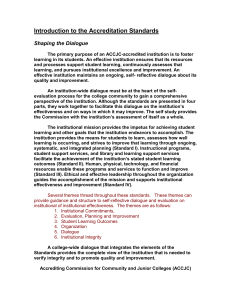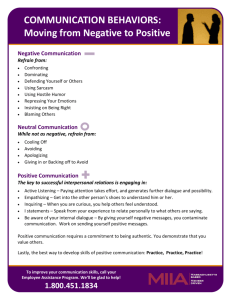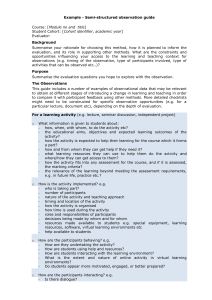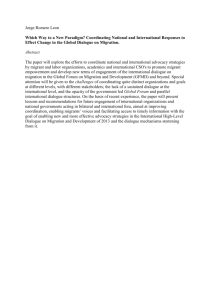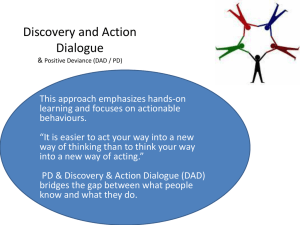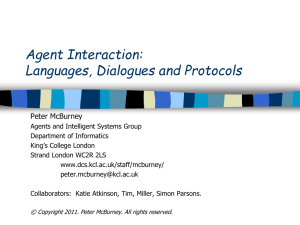Day Six Slideshow
advertisement
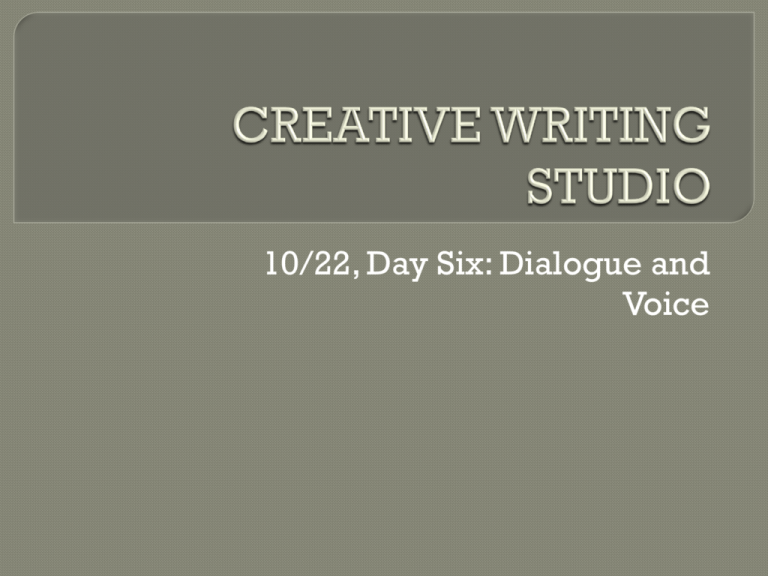
10/22, Day Six: Dialogue and Voice Part 1. A married couple is speaking. The woman wants a divorce. The man does not. Write a page of dialogue between them. At the end of the page, one of them convinces the other. Use dialogue only. No description, action or thought. Now write the same scene in exposition. Use no dialogue. Take your original scene in dialogue and judiciously add some of the description, action, and thought that might fill out the scene. Make sure that the dialogue is still doing most of the heavy lifting. Jacob followed Lisa into the kitchen. He asked why she wanted a divorce, but she wouldn’t give him a straight answer. She kept moving, from sink to cabinet to dishwasher, not looking at him at all, focusing all her attention on the dishes, putting the clean ones away, loading the dirty ones up. She wouldn’t look him in the eye. He kept following her, sticking right by her elbow, just like Misha the dog did whenever Jacob took him jogging. Misha would run right by his right flank, so close that sometimes Jacob tripped on him. It drove him crazy. He was aware he was doing this now with Lisa, but he couldn’t help himself. He followed her to the cabinet, back to the dishwasher, talking, talking, talking all the while. Finally, she turned and barked a sentence at him that shocked him so completely, he couldn’t believe she’d said it at first. They stared at each other nose to nose until the next thing he knew, he was staring at the cold beam of the fluorescent light on the ceiling. He blinked. Lisa was shaking his shoulder and calling his name. He had passed out. My name is Luke Ripley, and here is what I call my life: I own a stable of thirty horses, and I have young people who teach riding, and we board some horses too. This is in northeastern Massachusetts. I have a barn with an indoor ring, and outside I’ve got two fenced-in rings and a pasture that ends at a woods with trails. I call it my life because it looks like it is, and people I know call it that, but it’s a life I can get away from when I hunt and fish, and some nights after dinner when I sit in the dark in the front room and listen to opera. --Andre Dubus, “A Father’s Story” Lydia is dead. But they don’t know this yet. 1977, May 3, six thirty in the morning, no one knows anything but this innocuous fact: Lydia is late for breakfast. --Celeste Ng, Everything I Never Told You The looks. The sideways glances. The open gapes. They drive Dalt toward the biblical. Smiting and rending. Relax, Bub, I tell him, they’re not about me. Some hag in a wheelchair, arm quaking? They’ve all seen that before. Ho hum, ho hum. What snaps the heads around, drops jaws, is Dalt pushing the chair. I mean, Dalt, the original idea for Michelangelo’s David, chained to this harpy? --Pete Fromm, If Not For This Immediately after the explosion, the Reverend Mr. Kiyoshi Tanimoto, having run wildly out of the Matsui estate and having looked in wonderment at the bloody soldiers at the mouth of the dugout they had been digging, attached himself sympathetically to an old lady who was walking along in a daze, holding her head with her left hand, supporting a small boy of three or four on her back with her right, and crying, “I’m hurt! I’m hurt! I’m hurt!” --John Hersey, “Hiroshima” The day of my father’s funeral had also been my nineteenth birthday. As we drove him to the graveyard, the spoils of injustice, anarchy, discontent, and hatred were all around us. It seemed to me that God himself had devised to mark my father’s end, the most sustained and brutally dissonant of codas. And it seemed to me, too, that the violence which rose all about us as my father left the world had been devised as a corrective for the pride of his eldest son. I had declined to believe in that apocalypse which had been central to my father’s vision; very well, life seemed to be saying, here is something that will certainly pass for an apocalypse until the real thing comes along. --James Baldwin, “Notes of a Native Son”



